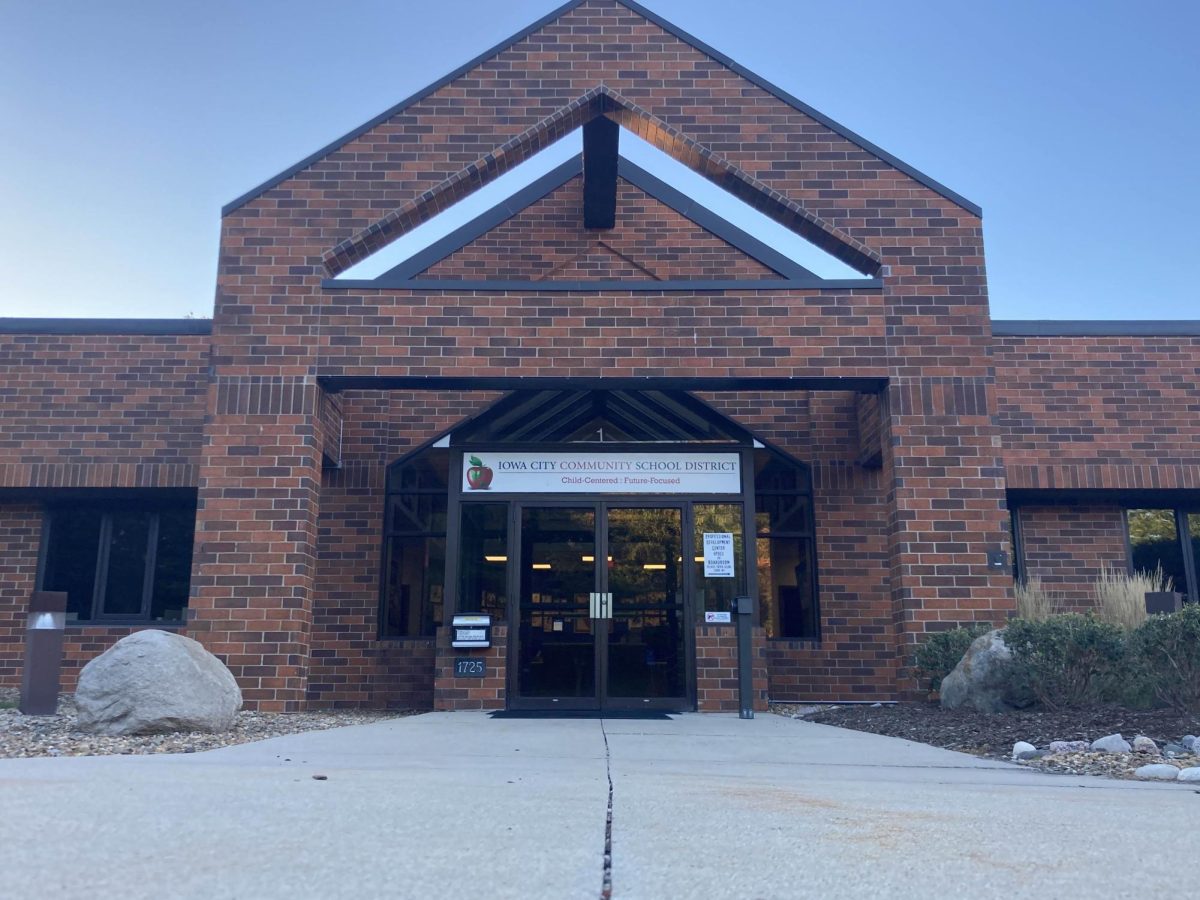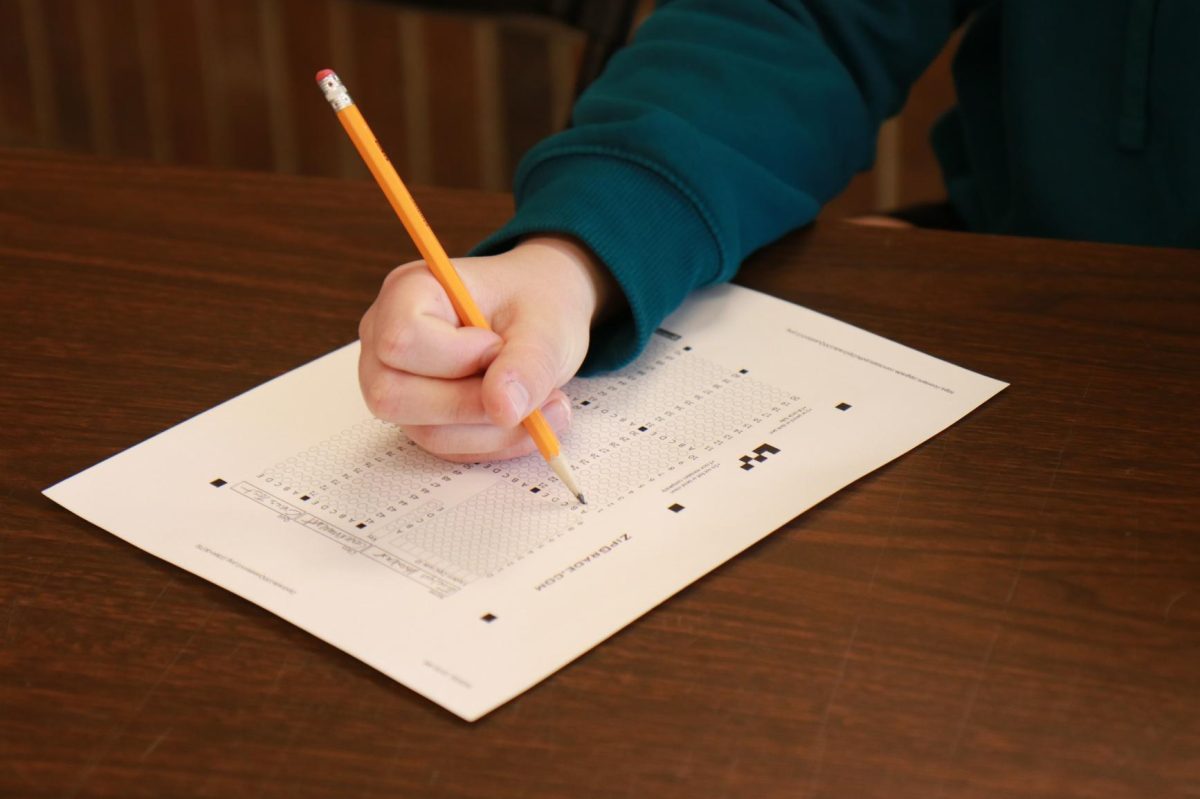Members of Shimek Elementary School were informed earlier in the month that the school was being considered for optimization, possibly including an elementary school pairing, creating an academy school or even shutting it down to create a pre-kindergarten center. On Sept. 10, the board room was full of concerned community members wanting to hear more about the plan. The board discussed its plans to change the elementary education system due to budget cuts and, later, during the work meeting, discussed possibilities for new phone policies.
Reenvisioning elementary education
Due to repeated budget cuts, the ICCSD board has to find more ways to save money and use more resources efficiently. The current plan to achieve this is to restructure the elementary school system. The board is currently discussing the possibility of moving towards an 18-section school system. This system would involve creating three classes in each grade from kindergarten to fifth grade. Through this system, they aim to achieve more consistent class sizes, maximum building efficiency, increased collaboration, equitable opportunities and a more efficient use of support staff.
As a part of this, the board is considering implementing paired schools, academy schools and Pre-K education centers. This could lead to school buildings being shut down and reused to fit the purpose of a different kind of school.
A week prior, the board announced a plan that implied that Shimek Elementary School could be converted to a Pre-K center as soon as next year. Multiple Shimek Elementary School community members were at the meeting and expressed their concerns during the community comment portion. Many of these parents expressed concerns about the kids’ mental health, transportation and the community aspects that would be harmed by sending the kids to another school. Still, the board stresses that it needs to make plans to change the elementary school system to increase efficiency.
Only one community member had positive things to say about the changes. Allison Largo, a hospital interpreter, talked about how a bilingual school could benefit her child. Largo said when she moved back from Texas with her husband, they wanted to find a place in West Liberty to send their child to a bilingual school and believes that the addition of these programs to the district could be very beneficial.
The board will form separate committees dedicated to researching the different aspects of this plan. While there are no set plans, the board stresses that it needs to move toward the optimization of schools due to cuts in funding from the state.
New phone policies
The board discussed the results of the survey that they sent out to district staff last week. The survey found that more than half of school staff thought that the current policy was only slightly effective or not effective at all. There was also a significant difference in the administrator’s and teacher’s responses to the survey. When it came to consistent enforcement of the policy, 35% of teachers said it was frequently consistently enforced, whereas 61% of administrators had that response. A second survey was sent to students and guardians on Sept. 23 and will be analyzed after two weeks.
They discussed four main possibilities for a district-wide policy: the use of cell phone bags, a bell-to-bell ban, individual classroom storage and leaving it to the students to store their phones in their backpacks during class.
The idea of cell phone bags was brought up, but they were generally agreed to be far too expensive.
Board member Lisa Williams advocated for a bell-to-bell ban, meaning students wouldn’t be able to have their phones out from the second the bell rings in the morning to when it rings in the afternoon; this would include passing time and lunch. “That’s where my head is [at]. A bell to bell thing done without a locker, without a bag, just cell phones are not allowed to be visible. Bell to bell. And the reason that I like that is it’s easiest to enforce, right? Like you don’t have to [think] ‘It’s a study hall. Is it passing period? Is it lunch?’” Williams said.
Superintendent Matt Degner expressed concerns about how this would work in high schools, where students have a lot more freedom. “I’m not sold on what the right answer is here … I also think about trying to manage a no cell phone environment from eight to three just with the phone in the kid’s pocket and expect [teachers] to do that. That’s a nightmare scenario for a large high school. They’re going to find those crannies, bathrooms, all over the place, right? … Is that a reasonable expectation, or is it for the 45 minutes you’re in the classroom, no phone out?” Degner said.
Another board member proposed the idea of having slots on the door that students would put their phones in when they enter the classroom, they would then be able to retrieve them when they leave. This is similar to what was done at Northwest Middle School last year, but this was used as a punishment for having a phone out in class instead of a general practice.
The board expressed the importance of enforcing the new policy. One member brought up an example of a policy made at Northwest Middle School prohibiting recording fights. Once students were punished, as the school said they would be, it was no longer an issue. Almost half of ICCSD staff who responded to the survey said the current policy was only enforced occasionally, rarely or never.
Members also recognized that staff also struggle to be off their phones and sympathize with students. Board member Mitch Lingo argues that it isn’t entirely fair to ask students to be off their phones for the whole school day, when their teaches aren’t doing the same.
“When they’re bringing up the secondary issue that we’ll have to work through is that our policy for students is no phones from nine to four and we have teachers and support staff pulling their phones out it will soon create that conflict between students and teachers,” Lingo said.
They will continue to draft a policy in the coming weeks and expect to have a policy by late October. It is possible that this deadline will need to be extended, but some board members were adamant about getting this policy done and rolled out as soon possible.
















